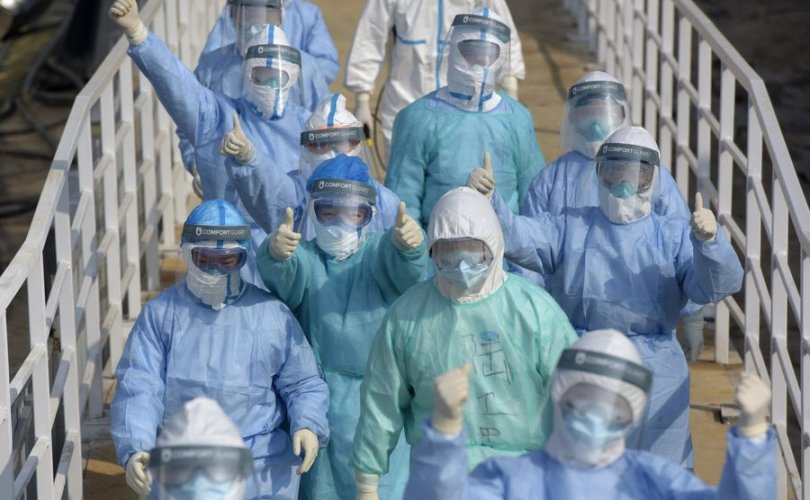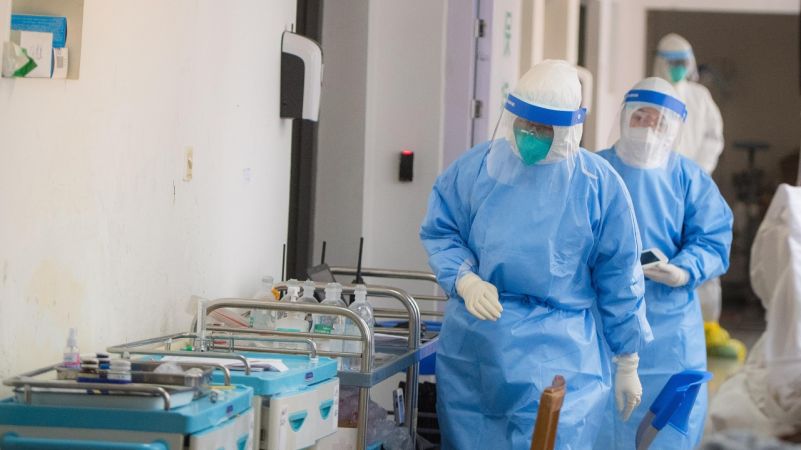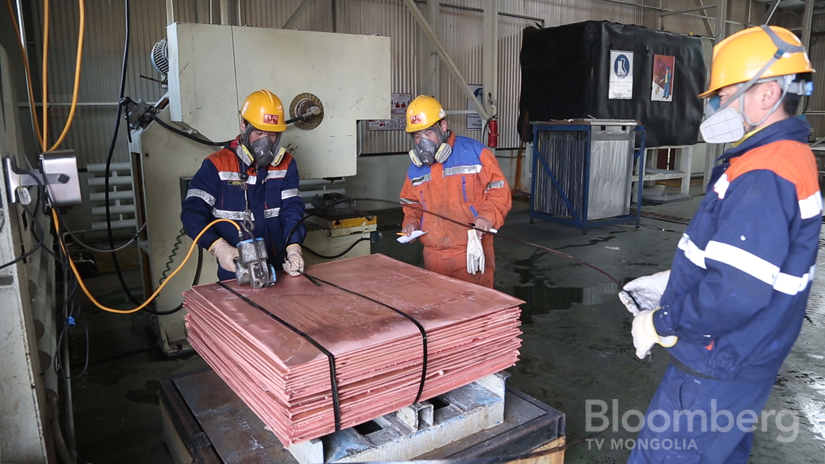Events
| Name | organizer | Where |
|---|---|---|
| MBCC “Doing Business with Mongolia seminar and Christmas Receptiom” Dec 10. 2025 London UK | MBCCI | London UK Goodman LLC |
NEWS

Pandemic-related hospitalizations drop in below 6000 www.news.mn
Today (17 February), Mongolia reported 874 new COVID-19 cases in the last 24 hours, bringing the national tally to 459,183. Meanwhile, three more COVID-19 patients died in the past day, bringing the death toll to 2,152.
The daily tally showed pandemic-related hospitalizations stood at 5,937, a drop of 230 compared with the previous day. This includes 45 patients in intensive care units, a decrease of three. Furthermore, 19,557 Covid-19 patients are receiving home-based care; decreased from 20,637 on 16 February.
Mongolia on Monday canceled a heightened state of readiness imposed in February 2020 due to the COVID-19 pandemic and resumed in-person classes for all levels of educational institutions. The decisions were made based on the country’s infection rate, high vaccination coverage, and assessments by relevant authorities.
So far, 66.8 percent of the country’s population of 3.4 million people have received two COVID-19 vaccine doses, while more than 1 million people over 18 received a third dose. More than 91,000 people have received a fourth shot, which the country started to administer in January on a voluntary basis.

Mongolian coals to be transferred to the Chinese trains in Gantsmod www.news.mn
The construction of a railway at Gashuunsukhait-Gantsmod – the port handles more than 50 percent of Mongolia’s copper and coking coal exports was one of key issues at talks between Mongolian Prime Minister L.Oyun-Erdene and Chinese President Xi Jinping. The meeting was held on 7 February when L.Oyun-Erdene attended the Opening Ceremony of the 2022 Beijing Winter Olympics.
The Gashuunsukhait-Gantsmod border crossing has been a contentious topic for Mongolian policymakers for years. Although different parties and ministries have agreed on the economic importance of the railroad, they disagreed on many important technical aspects such as the railroad gauge, allocation of investment, and the environmental and geological impacts that come with such a significant megaproject. The financial question was one of the major hurdles as well. The China-proposed railroad project is more costly than what the Mongolians envisioned.
This means Mongolian coals will be transferred to the Chinese trains in Gantsmod.

The Hu to rock at this year’s Coachella Festival www.news.mn
The Mongolian folk-metal group announced a slew of tour dates following their show at this year’s Coachella Festival on 15 April, 2022.
Following Coachella, the band will be on the road until ending May 31, 2022 in Mexico City. The group is leaving no stone unturned. The tour includes stops in San Diego, Las Vegas, Detroit, Maine, Washington, DC, Nashville, and Dallas.
The band has said the tour will continue to tease new music from their highly anticipated second album, due later this year from Better Noise Music.
Founded in 2016, the band hails from Mongolia. They blend heavy metal and traditional Mongolian throat singing. The group of four guys describes their style as “Hunnu Rock.” The Hunnu people were an ancient Mongolian empire. Their name, The Hu, is the Mongolian root word for human being.

Foreign Investment Agency to be re-established under Ministry of Economy and Development www.montsame.mn
Today on February 16, Minister of Finance B.Javkhlan announced that the strategy and development policy for the Ministry of Economy and Development was approved at the regular Cabinet meeting.
With the changes made to the 2022 State Budget and the Law on the Government, the Ministry of Economy and Development was officially established in January this year. “By having the strategy and development policy approved by the Cabinet, the Ministry is provided with opportunities and proper structure to fulfill its duties that have been reflected in the respective law. In its framework, an agency is also being established on foreign investment,” highlighted Minister B.Javkhlan.
“Previously, the Foreign Investment Agency carried out its operations independently under the Government. The agency is now being re-established under the current government after many years. With the re-establishment of the agency, Mongolia’s mid- and long-term policies and plans for foreign investment will become very clear, creating the appropriate conditions to connect foreign investors to large-scale construction projects being carried out domestically as well as with other economic sectors. The agency will be in charge of promoting current opportunities for making investments in Mongolia by carrying out wide-scale works to introduce the country’s business sectors,” he said.

Agreement on external inspection and sample of copper concentrate renewed www.montsame.mn
On February 15, Central Geological Laboratory state-owned enterprise and Oyu Tolgoi LLC renewed and signed the agreement to conduct an external inspection and sample of copper concentrate for export.
Under the government’s resolution dated in 2013, the Central Geological Laboratory (CGL) became responsible for conducting an external inspection and sample of copper concentrate for export. Accordingly, the CGL and Oyu Tolgoi LLC first established the agreement on June 1, 2013.
The laboratory has been continuously performing high-quality and international standards works, such as taking samples from every packaged copper concentrate to be exported by Oyu Tolgoi, determining moisture, preparing samples for testing, carrying out chemical analysis and submitting test results.
Since 2013, the laboratory has analyzed about 6.5 million tons of Oyu Tolgoi’s concentrate.
Director of the Central Geological Laboratory O. Davaasambuu said that the agreement has been renewed for five years in connection with the commencement of underground mining operations. He added that according to the renewed agreement, OT’s concentrate sample preparation and inspection work contracts would be established separately, reflecting consumer price index and international standard price for inspection.
The laboratory determines the content of copper, gold, silver and 20 elements in the packaged copper concentrates of Oyu Tolgoi LLC using internationally approved methods, including standard chemical and modern instrumental analysis methods.

COVID-19: 834 cases, one death reported www.montsame.mn
The Ministry of Health reported today, February 16 that 834 СOVID-19 cases were recorded in the last 24 hours nationwide. In detail, 479 cases were reported in Ulaanbaatar city, with 355 cases in 21 provinces.
It was also reported that one COVID-19 related death has been reported in the past 24 hours, raising the country’s death toll to 2,077. Currently, there are 6,167 people are receiving hospital treatment for COVID-19 whilst 20,637 people with mild symptoms are being treated at home. Of the total patients currently undergoing treatment at hospitals, there are 1,723 patients in mild, 3,855 in serious, 541 in critical, and 48 in very critical conditions.
As of today, the coverage of 1st dose has reached 69.8 percent (2,270,545), 2nd dose – 66.8 percent (2,171,826) and 3rd dose or a booster shot of COVID-19 vaccines – 31.0 percent (1,015,670) of the total population. In addition, 92,216 people (2.8 percent) have received 4th vaccine dose.

Coal is still raising trillions of dollars despite green shift www.bloomberg.com
The dirtiest fossil fuel is still raising trillions of dollars of funding, despite finance industry pledges to back net zero carbon targets by the middle of the century.
Commercial banks have channeled more than $1.5 trillion across the coal supply chain since the start of 2019, according to a report from German researcher Urgewald and its partners. The findings come just over three months after dozens of banks joined Mark Carney’s global alliance to achieve net-zero emissions from finance.
Most agree it’s necessary to fight rising temperatures, yet few major global banks are willing to shun profitable fossil-fuel clients. The biggest coal lenders included Mizuho Financial Group Inc., Barclays Plc, Citigroup Inc. and JPMorgan Chase & Co., the study showed. Chinese banks dominated the underwriting of capital raised by the coal industry.
“What we’re seeing is the tip of the iceberg,” said Heffa Schuecking, founder of Urgewald, in an interview. “This is a clear sign that companies aren’t transitioning.”
Coal sector financing
The study comes with the world burning more coal than ever as the economy bounces back from Covid-19, raising fears that 2022 could be a year of backsliding for some climate initiatives.
Still, there were some signs of a drop in financing during 2020 and 2021, though it wasn’t clear if that was the start of a trend or just the impact of the pandemic on the economy, according to Katrin Ganswindt, head of financial research at Urgewald.
Institutional investors have combined holdings of more than $1.2 trillion in the coal industry. BlackRock Inc. and Vanguard Group Inc. are the two largest, with share and bond holdings of over $100 billion each, according to the report. Both firms are members of the Net Zero Asset Managers Initiative.
There’s growing concern that coal plants could be left as stranded assets during the green transition, with countries favoring renewable power sources. Yet the report’s findings show that banks and asset managers still see opportunities to make a return.
“Vast amounts of cash are provided to an industry that is our climate’s worst enemy,” said Ganswindt.
(By John Ainger)

Banks spend big bucks on coal projects – study www.rt.com
Commercial banks have reportedly invested some $1.5 trillion in the coal industry since 2019. The study released by campaign groups Urgewald and Reclaim Finance on Tuesday says financial giants from the US, China, Japan, India, Canada and the UK play a major role in keeping the coal industry afloat, while policymakers and business leaders persistently call for energy transition.
The research says big investors from the listed nations are responsible for more than 80% of coal financing and investment.
“These financial institutions must come under fire from all quarters: civil society organizations, financial regulators, customers and progressive investors,” Katrin Ganswindt, head of financial research at Urgewald, said in the report seen by CNBC. “Unless we end financing of coal, it will end us.”
The research outlines all corporate lending and underwriting for companies on Urgewald’s Global Coal Exit List (GCEL) but excludes green bonds and financing that is directed toward non-coal activities. It refers to a list of 1,032 corporations accounting for 90% of the world’s thermal coal production and coal-fired capacity.
Big banks pump billions into fossil fuels despite net zero pledges – climate group
“Banks like to argue that they want to help their coal clients transition, but the reality is that almost none of these companies are transitioning. And they have little incentive to do so as long as bankers continue writing them blank checks,” Ganswindt said.
The findings show that 484 commercial banks channeled $1.2 trillion to companies on the GCEL through underwriting from January 2019 through to November last year with just 12 of them accounting for 39% of the total underwriting since 2019. Another 376 lenders provided $363 billion to the coal industry.
Meanwhile, 10 of these so-called “dirty dozen” lenders are members of the UN’s Net Zero Banking Alliance – an industry-led initiative focused on aligning their portfolios with net-zero emissions by 2050.
Japan’s Mizuho Financial, Mitsubishi UFJ Financial and SMBC Group are reportedly the top three lenders providing loans to the coal sector. They are followed by the UK’s Barclays and Wall Street’s Citigroup.
The research also finds nearly 5,000 institutional investors with combined holdings of over $1.2 trillion in the coal industry with the top 25 investors accounting for 46% of the total. US asset managers Blackrock and Vanguard are reportedly the largest institutional investors in coal.

Xi and Putin agree on another gas pipeline www.mongoliaweekly.org
Just before the opening of the Winter Olympics in Beijing on February 4, Russian President Vladimir Putin became the first foreign leader to meet Chinese President Xi Jinping face-to-face in two years (Mongolian Prime Minister Oyun-Erdene met with Xi two days later).
Xi and Putin subsequently issued a joint statement through the Kremlin's press office. In the statement, China openly supported Russian opposition to the further enlargement of NATO and Moscow's other security demands in Europe, representing a new level of unity between the two countries.
At the same time, Russian gas giant Gazprom signed a 30-year contract with the state-owned China National Petroleum Corporation (CNPC) to supply gas to China through a new pipeline from the island of Sakhalin.
Once operational, the new line will increase Russian gas supply to China by 10 billion cubic metres per year (bcm/yr), to a total forecast of 48 bcm/yr. The total includes 38 bcm/yr supplied through the Power of Siberia line. According to Reuters, the sales of gas could generate $37.5 billion over 25 years.
“This is already a second contract to be signed for Russian gas supplies to China, and it is indicative of the exceptionally strong mutual trust and partnership between our countries and companies. Our Chinese partners from CNPC have already seen for themselves that Gazprom is a reliable gas supplier,” Gazprom chief Alexey Miller said in a statement.
In the same statement, Gazprom also noted the completion of the feasibility study for the Soyuz Vostok gas trunkline across Mongolia, an extension of the Power of Siberia 2 line that Gazprom says will 'make it possible to supply up to 50 bcm/yr of gas to China' – in effect doubling current exports.
The study, which relied on on-site surveys, mapping and route analysis conducted by Mongolian companies, outlines a plan for the pipeline to stretch 962.9 kilometres across Mongolia, including five compressor stations.
Russia's eastern pipelines, including the Power of Siberia, are not connected to Russia's pipeline distribution network to Europe – though a connection is possible, which would place CNPC in direct competition with European buyers for Russian gas, a situation which some believe has made Russian gas less attractive to the Chinese.
However, when seen in the context of Putin's meeting with Xi and increasing Chinese support for Russian foreign policy, this latest deal indicates that Beijing may have more tolerance for increasing its dependence on Russian energy. Russia currently supplies about five per cent of Chinese gas demand through both pipeline and LNG exports and is China's second-biggest oil supplier after Saudi Arabia.
If so, this could be good news for the Power of Siberia 2 trunkline across Mongolia, which would create a new source of income for the Mongolian government.
Yet Chinese investments in energy imports seem to occur irrespective of wider geopolitical tensions. In December, American company Venture Global announced that it had signed a 20-year deal with China National Offshore Oil Corporation (CNOOC), the first of its kind.
Beneath all this lies China's relentless demand for gas: the country became the world's largest buyer of LNG in 2021. The growing market has seen companies such as Elixir Energy exploring potential natural gas deposits under Mongolia's Gobi desert for export to China.
Yet hard questions remain for Mongolia to answer. How much dependence on Russian energy is Beijing willing to tolerate, and is there an opportunity for Mongolian gas development?
And looking beyond energy: is Mongolia in the middle of increasing geopolitical alignment between Beijing and Moscow?

Cooperatives in Mongolia Celebrated 100th Anniversary www.icaap.coop
The first cooperative in Mongolia was established 100 years ago, on 02 November 1921, by the decree of the Bogd Khan under the name “People’s Mutual Aid Cooperative” with 116 members. Shortly after the victory of the People's Revolution, the leaders of that time initiated and found this cooperative as there was a need and the newly formed government also supported the cooperatives. This movement, united by wealth, labor, and desire made a significant contribution to the employment of many people and increased social labor productivity at that time.
Today, a total of 4,468 cooperatives with 234,633 members, incorporating MNT 49.6 billion, are making a significant contribution to the socio-economic development in Mongolia.
To celebrate the 100th anniversary of the cooperative movement, the Mongolian National Cooperative Alliance (MNCA) and the National Association of Mongolian Agricultural Cooperatives (NAMAC), organized many events with the Ministry of Agriculture and Light Industry to promote the cooperatives’ contribution to the country’s development. One of the key highlights of this celebration was the adoption of the newly revised law on cooperatives by the Parliament of Mongolia. The significant changes in the law will strengthen the governance of the cooperatives, protect the property of the cooperatives, and clarify the state's participation in the development of the cooperatives. The cooperators believe that the adoption of this law will help to improve the legal environment for further development of the Mongolian cooperative movement.
The Prime Minister of Mongolia, L.Oyun-Erdene, in the 7th National Forum of Cooperatives, organized as part of the 100th-anniversary celebrations, congratulated the cooperatives and appreciated their role in the country's development. He announced that the Government of Mongolia has decided to launch the “New Cooperatives” Campaign in 2022 to enrich a new model for modern development.
- «
- 1
- 2
- 3
- 4
- 5
- 6
- 7
- 8
- 9
- 10
- 11
- 12
- 13
- 14
- 15
- 16
- 17
- 18
- 19
- 20
- 21
- 22
- 23
- 24
- 25
- 26
- 27
- 28
- 29
- 30
- 31
- 32
- 33
- 34
- 35
- 36
- 37
- 38
- 39
- 40
- 41
- 42
- 43
- 44
- 45
- 46
- 47
- 48
- 49
- 50
- 51
- 52
- 53
- 54
- 55
- 56
- 57
- 58
- 59
- 60
- 61
- 62
- 63
- 64
- 65
- 66
- 67
- 68
- 69
- 70
- 71
- 72
- 73
- 74
- 75
- 76
- 77
- 78
- 79
- 80
- 81
- 82
- 83
- 84
- 85
- 86
- 87
- 88
- 89
- 90
- 91
- 92
- 93
- 94
- 95
- 96
- 97
- 98
- 99
- 100
- 101
- 102
- 103
- 104
- 105
- 106
- 107
- 108
- 109
- 110
- 111
- 112
- 113
- 114
- 115
- 116
- 117
- 118
- 119
- 120
- 121
- 122
- 123
- 124
- 125
- 126
- 127
- 128
- 129
- 130
- 131
- 132
- 133
- 134
- 135
- 136
- 137
- 138
- 139
- 140
- 141
- 142
- 143
- 144
- 145
- 146
- 147
- 148
- 149
- 150
- 151
- 152
- 153
- 154
- 155
- 156
- 157
- 158
- 159
- 160
- 161
- 162
- 163
- 164
- 165
- 166
- 167
- 168
- 169
- 170
- 171
- 172
- 173
- 174
- 175
- 176
- 177
- 178
- 179
- 180
- 181
- 182
- 183
- 184
- 185
- 186
- 187
- 188
- 189
- 190
- 191
- 192
- 193
- 194
- 195
- 196
- 197
- 198
- 199
- 200
- 201
- 202
- 203
- 204
- 205
- 206
- 207
- 208
- 209
- 210
- 211
- 212
- 213
- 214
- 215
- 216
- 217
- 218
- 219
- 220
- 221
- 222
- 223
- 224
- 225
- 226
- 227
- 228
- 229
- 230
- 231
- 232
- 233
- 234
- 235
- 236
- 237
- 238
- 239
- 240
- 241
- 242
- 243
- 244
- 245
- 246
- 247
- 248
- 249
- 250
- 251
- 252
- 253
- 254
- 255
- 256
- 257
- 258
- 259
- 260
- 261
- 262
- 263
- 264
- 265
- 266
- 267
- 268
- 269
- 270
- 271
- 272
- 273
- 274
- 275
- 276
- 277
- 278
- 279
- 280
- 281
- 282
- 283
- 284
- 285
- 286
- 287
- 288
- 289
- 290
- 291
- 292
- 293
- 294
- 295
- 296
- 297
- 298
- 299
- 300
- 301
- 302
- 303
- 304
- 305
- 306
- 307
- 308
- 309
- 310
- 311
- 312
- 313
- 314
- 315
- 316
- 317
- 318
- 319
- 320
- 321
- 322
- 323
- 324
- 325
- 326
- 327
- 328
- 329
- 330
- 331
- 332
- 333
- 334
- 335
- 336
- 337
- 338
- 339
- 340
- 341
- 342
- 343
- 344
- 345
- 346
- 347
- 348
- 349
- 350
- 351
- 352
- 353
- 354
- 355
- 356
- 357
- 358
- 359
- 360
- 361
- 362
- 363
- 364
- 365
- 366
- 367
- 368
- 369
- 370
- 371
- 372
- 373
- 374
- 375
- 376
- 377
- 378
- 379
- 380
- 381
- 382
- 383
- 384
- 385
- 386
- 387
- 388
- 389
- 390
- 391
- 392
- 393
- 394
- 395
- 396
- 397
- 398
- 399
- 400
- 401
- 402
- 403
- 404
- 405
- 406
- 407
- 408
- 409
- 410
- 411
- 412
- 413
- 414
- 415
- 416
- 417
- 418
- 419
- 420
- 421
- 422
- 423
- 424
- 425
- 426
- 427
- 428
- 429
- 430
- 431
- 432
- 433
- 434
- 435
- 436
- 437
- 438
- 439
- 440
- 441
- 442
- 443
- 444
- 445
- 446
- 447
- 448
- 449
- 450
- 451
- 452
- 453
- 454
- 455
- 456
- 457
- 458
- 459
- 460
- 461
- 462
- 463
- 464
- 465
- 466
- 467
- 468
- 469
- 470
- 471
- 472
- 473
- 474
- 475
- 476
- 477
- 478
- 479
- 480
- 481
- 482
- 483
- 484
- 485
- 486
- 487
- 488
- 489
- 490
- 491
- 492
- 493
- 494
- 495
- 496
- 497
- 498
- 499
- 500
- 501
- 502
- 503
- 504
- 505
- 506
- 507
- 508
- 509
- 510
- 511
- 512
- 513
- 514
- 515
- 516
- 517
- 518
- 519
- 520
- 521
- 522
- 523
- 524
- 525
- 526
- 527
- 528
- 529
- 530
- 531
- 532
- 533
- 534
- 535
- 536
- 537
- 538
- 539
- 540
- 541
- 542
- 543
- 544
- 545
- 546
- 547
- 548
- 549
- 550
- 551
- 552
- 553
- 554
- 555
- 556
- 557
- 558
- 559
- 560
- 561
- 562
- 563
- 564
- 565
- 566
- 567
- 568
- 569
- 570
- 571
- 572
- 573
- 574
- 575
- 576
- 577
- 578
- 579
- 580
- 581
- 582
- 583
- 584
- 585
- 586
- 587
- 588
- 589
- 590
- 591
- 592
- 593
- 594
- 595
- 596
- 597
- 598
- 599
- 600
- 601
- 602
- 603
- 604
- 605
- 606
- 607
- 608
- 609
- 610
- 611
- 612
- 613
- 614
- 615
- 616
- 617
- 618
- 619
- 620
- 621
- 622
- 623
- 624
- 625
- 626
- 627
- 628
- 629
- 630
- 631
- 632
- 633
- 634
- 635
- 636
- 637
- 638
- 639
- 640
- 641
- 642
- 643
- 644
- 645
- 646
- 647
- 648
- 649
- 650
- 651
- 652
- 653
- 654
- 655
- 656
- 657
- 658
- 659
- 660
- 661
- 662
- 663
- 664
- 665
- 666
- 667
- 668
- 669
- 670
- 671
- 672
- 673
- 674
- 675
- 676
- 677
- 678
- 679
- 680
- 681
- 682
- 683
- 684
- 685
- 686
- 687
- 688
- 689
- 690
- 691
- 692
- 693
- 694
- 695
- 696
- 697
- 698
- 699
- 700
- 701
- 702
- 703
- 704
- 705
- 706
- 707
- 708
- 709
- 710
- 711
- 712
- 713
- 714
- 715
- 716
- 717
- 718
- 719
- 720
- 721
- 722
- 723
- 724
- 725
- 726
- 727
- 728
- 729
- 730
- 731
- 732
- 733
- 734
- 735
- 736
- 737
- 738
- 739
- 740
- 741
- 742
- 743
- 744
- 745
- 746
- 747
- 748
- 749
- 750
- 751
- 752
- 753
- 754
- 755
- 756
- 757
- 758
- 759
- 760
- 761
- 762
- 763
- 764
- 765
- 766
- 767
- 768
- 769
- 770
- 771
- 772
- 773
- 774
- 775
- 776
- 777
- 778
- 779
- 780
- 781
- 782
- 783
- 784
- 785
- 786
- 787
- 788
- 789
- 790
- 791
- 792
- 793
- 794
- 795
- 796
- 797
- 798
- 799
- 800
- 801
- 802
- 803
- 804
- 805
- 806
- 807
- 808
- 809
- 810
- 811
- 812
- 813
- 814
- 815
- 816
- 817
- 818
- 819
- 820
- 821
- 822
- 823
- 824
- 825
- 826
- 827
- 828
- 829
- 830
- 831
- 832
- 833
- 834
- 835
- 836
- 837
- 838
- 839
- 840
- 841
- 842
- 843
- 844
- 845
- 846
- 847
- 848
- 849
- 850
- 851
- 852
- 853
- 854
- 855
- 856
- 857
- 858
- 859
- 860
- 861
- 862
- 863
- 864
- 865
- 866
- 867
- 868
- 869
- 870
- 871
- 872
- 873
- 874
- 875
- 876
- 877
- 878
- 879
- 880
- 881
- 882
- 883
- 884
- 885
- 886
- 887
- 888
- 889
- 890
- 891
- 892
- 893
- 894
- 895
- 896
- 897
- 898
- 899
- 900
- 901
- 902
- 903
- 904
- 905
- 906
- 907
- 908
- 909
- 910
- 911
- 912
- 913
- 914
- 915
- 916
- 917
- 918
- 919
- 920
- 921
- 922
- 923
- 924
- 925
- 926
- 927
- 928
- 929
- 930
- 931
- 932
- 933
- 934
- 935
- 936
- 937
- 938
- 939
- 940
- 941
- 942
- 943
- 944
- 945
- 946
- 947
- 948
- 949
- 950
- 951
- 952
- 953
- 954
- 955
- 956
- 957
- 958
- 959
- 960
- 961
- 962
- 963
- 964
- 965
- 966
- 967
- 968
- 969
- 970
- 971
- 972
- 973
- 974
- 975
- 976
- 977
- 978
- 979
- 980
- 981
- 982
- 983
- 984
- 985
- 986
- 987
- 988
- 989
- 990
- 991
- 992
- 993
- 994
- 995
- 996
- 997
- 998
- 999
- 1000
- 1001
- 1002
- 1003
- 1004
- 1005
- 1006
- 1007
- 1008
- 1009
- 1010
- 1011
- 1012
- 1013
- 1014
- 1015
- 1016
- 1017
- 1018
- 1019
- 1020
- 1021
- 1022
- 1023
- 1024
- 1025
- 1026
- 1027
- 1028
- 1029
- 1030
- 1031
- 1032
- 1033
- 1034
- 1035
- 1036
- 1037
- 1038
- 1039
- 1040
- 1041
- 1042
- 1043
- 1044
- 1045
- 1046
- 1047
- 1048
- 1049
- 1050
- 1051
- 1052
- 1053
- 1054
- 1055
- 1056
- 1057
- 1058
- 1059
- 1060
- 1061
- 1062
- 1063
- 1064
- 1065
- 1066
- 1067
- 1068
- 1069
- 1070
- 1071
- 1072
- 1073
- 1074
- 1075
- 1076
- 1077
- 1078
- 1079
- 1080
- 1081
- 1082
- 1083
- 1084
- 1085
- 1086
- 1087
- 1088
- 1089
- 1090
- 1091
- 1092
- 1093
- 1094
- 1095
- 1096
- 1097
- 1098
- 1099
- 1100
- 1101
- 1102
- 1103
- 1104
- 1105
- 1106
- 1107
- 1108
- 1109
- 1110
- 1111
- 1112
- 1113
- 1114
- 1115
- 1116
- 1117
- 1118
- 1119
- 1120
- 1121
- 1122
- 1123
- 1124
- 1125
- 1126
- 1127
- 1128
- 1129
- 1130
- 1131
- 1132
- 1133
- 1134
- 1135
- 1136
- 1137
- 1138
- 1139
- 1140
- 1141
- 1142
- 1143
- 1144
- 1145
- 1146
- 1147
- 1148
- 1149
- 1150
- 1151
- 1152
- 1153
- 1154
- 1155
- 1156
- 1157
- 1158
- 1159
- 1160
- 1161
- 1162
- 1163
- 1164
- 1165
- 1166
- 1167
- 1168
- 1169
- 1170
- 1171
- 1172
- 1173
- 1174
- 1175
- 1176
- 1177
- 1178
- 1179
- 1180
- 1181
- 1182
- 1183
- 1184
- 1185
- 1186
- 1187
- 1188
- 1189
- 1190
- 1191
- 1192
- 1193
- 1194
- 1195
- 1196
- 1197
- 1198
- 1199
- 1200
- 1201
- 1202
- 1203
- 1204
- 1205
- 1206
- 1207
- 1208
- 1209
- 1210
- 1211
- 1212
- 1213
- 1214
- 1215
- 1216
- 1217
- 1218
- 1219
- 1220
- 1221
- 1222
- 1223
- 1224
- 1225
- 1226
- 1227
- 1228
- 1229
- 1230
- 1231
- 1232
- 1233
- 1234
- 1235
- 1236
- 1237
- 1238
- 1239
- 1240
- 1241
- 1242
- 1243
- 1244
- 1245
- 1246
- 1247
- 1248
- 1249
- 1250
- 1251
- 1252
- 1253
- 1254
- 1255
- 1256
- 1257
- 1258
- 1259
- 1260
- 1261
- 1262
- 1263
- 1264
- 1265
- 1266
- 1267
- 1268
- 1269
- 1270
- 1271
- 1272
- 1273
- 1274
- 1275
- 1276
- 1277
- 1278
- 1279
- 1280
- 1281
- 1282
- 1283
- 1284
- 1285
- 1286
- 1287
- 1288
- 1289
- 1290
- 1291
- 1292
- 1293
- 1294
- 1295
- 1296
- 1297
- 1298
- 1299
- 1300
- 1301
- 1302
- 1303
- 1304
- 1305
- 1306
- 1307
- 1308
- 1309
- 1310
- 1311
- 1312
- 1313
- 1314
- 1315
- 1316
- 1317
- 1318
- 1319
- 1320
- 1321
- 1322
- 1323
- 1324
- 1325
- 1326
- 1327
- 1328
- 1329
- 1330
- 1331
- 1332
- 1333
- 1334
- 1335
- 1336
- 1337
- 1338
- 1339
- 1340
- 1341
- 1342
- 1343
- 1344
- 1345
- 1346
- 1347
- 1348
- 1349
- 1350
- 1351
- 1352
- 1353
- 1354
- 1355
- 1356
- 1357
- 1358
- 1359
- 1360
- 1361
- 1362
- 1363
- 1364
- 1365
- 1366
- 1367
- 1368
- 1369
- 1370
- 1371
- 1372
- 1373
- 1374
- 1375
- 1376
- 1377
- 1378
- 1379
- 1380
- 1381
- 1382
- 1383
- 1384
- 1385
- 1386
- 1387
- 1388
- 1389
- 1390
- 1391
- 1392
- 1393
- 1394
- 1395
- 1396
- 1397
- 1398
- 1399
- 1400
- 1401
- 1402
- 1403
- 1404
- 1405
- 1406
- 1407
- 1408
- 1409
- 1410
- 1411
- 1412
- 1413
- 1414
- 1415
- 1416
- 1417
- 1418
- 1419
- 1420
- 1421
- 1422
- 1423
- 1424
- 1425
- 1426
- 1427
- 1428
- 1429
- 1430
- 1431
- 1432
- 1433
- 1434
- 1435
- 1436
- 1437
- 1438
- 1439
- 1440
- 1441
- 1442
- 1443
- 1444
- 1445
- 1446
- 1447
- 1448
- 1449
- 1450
- 1451
- 1452
- 1453
- 1454
- 1455
- 1456
- 1457
- 1458
- 1459
- 1460
- 1461
- 1462
- 1463
- 1464
- 1465
- 1466
- 1467
- 1468
- 1469
- 1470
- 1471
- 1472
- 1473
- 1474
- 1475
- 1476
- 1477
- 1478
- 1479
- 1480
- 1481
- 1482
- 1483
- 1484
- 1485
- 1486
- 1487
- 1488
- 1489
- 1490
- 1491
- 1492
- 1493
- 1494
- 1495
- 1496
- 1497
- 1498
- 1499
- 1500
- 1501
- 1502
- 1503
- 1504
- 1505
- 1506
- 1507
- 1508
- 1509
- 1510
- 1511
- 1512
- 1513
- 1514
- 1515
- 1516
- 1517
- 1518
- 1519
- 1520
- 1521
- 1522
- 1523
- 1524
- 1525
- 1526
- 1527
- 1528
- 1529
- 1530
- 1531
- 1532
- 1533
- 1534
- 1535
- 1536
- 1537
- 1538
- 1539
- 1540
- 1541
- 1542
- 1543
- 1544
- 1545
- 1546
- 1547
- 1548
- 1549
- 1550
- 1551
- 1552
- 1553
- 1554
- 1555
- 1556
- 1557
- 1558
- 1559
- 1560
- 1561
- 1562
- 1563
- 1564
- 1565
- 1566
- 1567
- 1568
- 1569
- 1570
- 1571
- 1572
- 1573
- 1574
- 1575
- 1576
- 1577
- 1578
- 1579
- 1580
- 1581
- 1582
- 1583
- 1584
- 1585
- 1586
- 1587
- 1588
- 1589
- 1590
- 1591
- 1592
- 1593
- 1594
- 1595
- 1596
- 1597
- 1598
- 1599
- 1600
- 1601
- 1602
- 1603
- 1604
- 1605
- 1606
- 1607
- 1608
- 1609
- 1610
- 1611
- 1612
- 1613
- 1614
- 1615
- 1616
- 1617
- 1618
- 1619
- 1620
- 1621
- 1622
- 1623
- 1624
- 1625
- 1626
- 1627
- 1628
- 1629
- 1630
- 1631
- 1632
- 1633
- 1634
- 1635
- 1636
- 1637
- 1638
- 1639
- 1640
- 1641
- 1642
- 1643
- 1644
- 1645
- 1646
- 1647
- 1648
- 1649
- 1650
- 1651
- 1652
- 1653
- 1654
- 1655
- 1656
- 1657
- 1658
- 1659
- 1660
- 1661
- 1662
- 1663
- 1664
- 1665
- 1666
- 1667
- 1668
- 1669
- 1670
- 1671
- 1672
- 1673
- 1674
- 1675
- 1676
- 1677
- 1678
- 1679
- 1680
- 1681
- 1682
- 1683
- 1684
- 1685
- 1686
- 1687
- 1688
- 1689
- 1690
- 1691
- 1692
- 1693
- 1694
- 1695
- 1696
- 1697
- 1698
- 1699
- 1700
- 1701
- 1702
- 1703
- 1704
- 1705
- 1706
- 1707
- 1708
- 1709
- 1710
- 1711
- 1712
- 1713
- 1714
- 1715
- 1716
- 1717
- 1718
- 1719
- 1720
- 1721
- 1722
- 1723
- 1724
- 1725
- 1726
- 1727
- »






